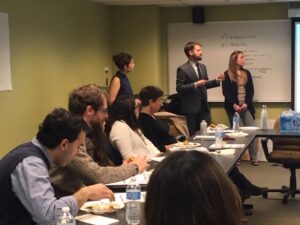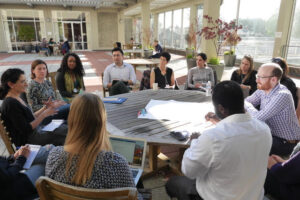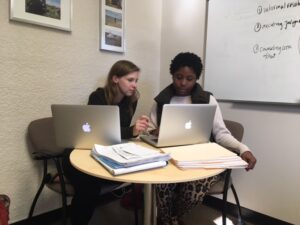In the Sheller Center’s Federal Reentry Court clinic, supervised by attorney Maya Sosnov, students work with people who are returning from incarceration. Here are some excerpts from students’ comments about their experiences.
Brian Mahoney, on what students actually do:
Law students in the Reentry Court help relieve post-incarceration poverty. They assist participants to restore their driving privileges, reduce outstanding debt, establish affordable payment plans, combat identity fraud, and to challenge other legal barriers … Students also help restore participant dignity by forming meaningful relationships with participants and by advocating vigorously for their rights in private and public forums. You won’t save the world as a student advocate in the Reentry Program, but you will make a meaningful difference.
Stefanie Sherr, on a comment from a client:
One experience really stood out to me when I was helping one of the participants with an identity theft issue, and things were a bit frustrating and slow moving. This participant sent me a text message about how much he really appreciated my help, and I was really happy to be able to help him.
Nina del Valle, on trust:
New participants on their first day are asked to come up to a podium and speak to the judge. The last time this occurred for the participants was when they were being sentenced. Participants are often hesitant to trust the reentry team when they tell them that we are here to support their successful return into the community. Over time, you see the changes in the participants because … through our actions participants see that there can be another side to the criminal justice system that is here to help.
Sarah Figorski, on the obstacles facing returning citizens:
This experience has completely opened my eyes to the many legal roadblocks and personal setbacks that stand in a person’s way when reentering back into society. I have personally assisted clients in working through various issues in traffic court. I have handled trials, worked out agreements with the District Attorney, opened up old cases for appeal, and reduced ticket prices. I have assisted other clients with debt issues by performing extensive research for them to help them understand complicated issues that they would have otherwise been left to deal with on their own.
TJ Denley on the clients and on the significance of the experience:
I have done intakes and assessments, filed motions, developed strategy, and even argued in court for my client. I have met some amazing clients, men who want to change their life, so that instead of living the nightmare, they can begin to live the dream…. The clinical has given me a wider perspective on the criminal justice system, as well as more confidence in my ability to represent my clients.
And Laurel Kandianis on what matters:
The work of social justice does not always entail speaking to a large crowd or arguing in front of the Supreme Court… Sometimes it is about working to correct the small inequities unnoticed by the people who do not suffer them. In Reentry Court Clinic, my work has consisted of attempting to push back against these small inequities. I have spent most of my time in traffic court and on the phone with various Pennsylvania bureaucracies, attempting to weave through the maze of obstacles between my clients and their licenses.
Not having a license can cripple a person’s ability to re-integrate back into society after release from incarceration…. Working to help clients regain their licenses is not high-profile, ground-breaking work. But it is for that reason, I’ve come to believe, that the work is important.
 ether with the Pennsylvania Immigration and Citizenship Coalition (PICC), Heather Adamick (‘21), Joshua Lachewitz (‘21), and Pretty Martinez (‘21) from the Social Justice Lawyering Clinic organized a convening about creating a worker center in Philadelphia. A worker center would help organize, advocate, and provide services to low-wage workers in Philadelphia. Individuals representing sixteen organizations attended from across Philadelphia. The purpose of the convening was to present information about the many conversations that the students have had with various stakeholders and to hear from advocates about what sort of worker center would best serve the needs of Philadelphia’s low-wage workers.
ether with the Pennsylvania Immigration and Citizenship Coalition (PICC), Heather Adamick (‘21), Joshua Lachewitz (‘21), and Pretty Martinez (‘21) from the Social Justice Lawyering Clinic organized a convening about creating a worker center in Philadelphia. A worker center would help organize, advocate, and provide services to low-wage workers in Philadelphia. Individuals representing sixteen organizations attended from across Philadelphia. The purpose of the convening was to present information about the many conversations that the students have had with various stakeholders and to hear from advocates about what sort of worker center would best serve the needs of Philadelphia’s low-wage workers.

